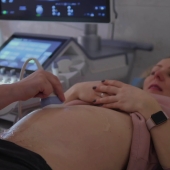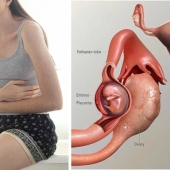Hyperemesis gravidarum (HG) is a complication of pregnancy characterized by intractable nausea, vomiting, and dehydration and is estimated to affect 0.5–2.0% of pregnant women. Malnutrition and other serious complications, such as fluid or electrolyte imbalances, may result.
Hyperemesis is considered a rare complication of pregnancy, but because nausea and vomiting during pregnancy exist on a spectrum, it is often difficult to distinguish this condition from the more common form of nausea and vomiting experienced during pregnancy known as morning sickness.
Dry bland food and oral rehydration are first-line treatments. Due to the potential for severe dehydration and other complications, HG is treated as an emergency. If conservative dietary measures fail, more extensive treatment such as the use of antiemetic medications and intravenous rehydration may be required.
If oral nutrition is insufficient, intravenous nutritional support may be needed. For women who require hospital admission, thromboembolic stockings or low-molecular-weight heparin may be used as measures to prevent the formation of a blood clot.
- 448 views













